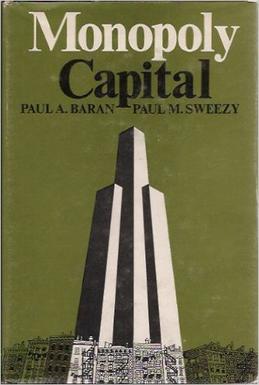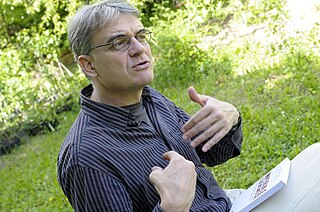
Bob Jessop FAcSS (born 3 March 1946) is a British academic who has published extensively on state theory and political economy. He is currently Distinguished Professor of Sociology at the University of Lancaster.

Bob Jessop FAcSS (born 3 March 1946) is a British academic who has published extensively on state theory and political economy. He is currently Distinguished Professor of Sociology at the University of Lancaster.
Jessop's major contribution to state theory is in treating the state not as an entity but as a social relation with differential strategic effects. This means that the state is not something with an essential, fixed property, such as a neutral coordinator of different social interests, an autonomous corporate actor with its own bureaucratic goals and interests, or the "executive committee of the bourgeoisie", as often described by pluralists, elitists/statists, and conventional Marxists, respectively. Rather, what the state is essentially determined by is the nature of the wider social relations in which it is situated, especially the balance of social forces.
The state can thus be understood as follows: First, the state has varied natures, apparatuses, and boundaries according to its historical and geographical developments as well as its specific conjunctures. One of these apparatuses is state projects, which include a mechanism that Jessop calls structural selectivity. He claims that state structures "offer unequal chances to different forces within and outside that state to act for different political purposes". [1] However, there is a strategic limit to this variation, imposed by the given balance of forces at specific time and space. Thus, second, the state has differential effects on various political and economic strategies in a way that privileges some over others, but at the same time, it is the interaction among these strategies that results in such exercise of state power. This approach is called the "strategic-relational approach" and can be considered as a creative extension and development of Marx's concept of capital not as a thing but as a social relation and of Antonio Gramsci's and Nicos Poulantzas's concept of the state as a social relation, something more than narrow political society.
Jessop uses the term "time sovereignty" (or "temporal sovereignty") to stand for a government's right to have at its disposition the time that is required for considered political decision-making. He states that this "time sovereignty" is endangered as governments see themselves pressured to compress their own decision-making cycles so that they can make more timely and appropriate interventions. [2]
A state is a centralized political organization that imposes and enforces rules over a population within a territory. Definitions of a state are disputed. One widely used definition comes from the sociologist Max Weber: a "state" is a polity that maintains a monopoly on the legitimate use of violence, although other definitions are common. Absence of a state does not preclude the existence of a society, such as stateless societies like the Haudenosaunee Confederacy that "do not have either purely or even primarily political institutions or roles". The level of governance of a state, government being considered to form the fundamental apparatus of contemporary states, is used to determine whether it has failed.

Manuel Castells Oliván is a Spanish sociologist. He is well known for his authorship of a trilogy of works, entitled The Information Age: Economy, Society and Culture. He is a scholar of the information society, communication and globalization.

Political sociology is an interdisciplinary field of study concerned with exploring how governance and society interact and influence one another at the micro to macro levels of analysis. Interested in the social causes and consequences of how power is distributed and changes throughout and amongst societies, political sociology's focus ranges across individual families to the state as sites of social and political conflict and power contestation.
Ecological modernization is a school of thought that argues that both the state and the market can work together to protect the environment. It has gained increasing attention among scholars and policymakers in the last several decades internationally. It is an analytical approach as well as a policy strategy and environmental discourse.

Nicos Poulantzas was a Greek-French Marxist political sociologist and philosopher. In the 1970s, Poulantzas was known, along with Louis Althusser, as a leading structural Marxist; while at first a Leninist, he eventually became a proponent of the "democratic road to socialism." He is best known for his theoretical work on the state, but he also offered Marxist contributions to the analysis of fascism, social class in the contemporary world, and the collapse of dictatorships in Southern Europe in the 1970s, such as Francisco Franco's rule in Spain, António de Oliveira Salazar's in Portugal, and Georgios Papadopoulos' in Greece.
The theory of state monopoly capitalism was initially a Marxist thesis popularised after World War II. Lenin had claimed in 1916 that World War I had transformed laissez-faire capitalism into monopoly capitalism, but he did not publish any extensive theory about the topic. The term refers to an environment where the state intervenes in the economy to protect larger monopolistic or oligopolistic businesses from threats. As conceived by Lenin in his pamphlet of the same name, the theory aims to describe the final historical stage of capitalism, of which he believed the Imperialism of that time to be the highest expression.

John Holloway is a Marxist-oriented lawyer, sociologist and philosopher, whose work is closely associated with the Zapatista movement in Mexico, his home since 1991. It has also been taken up by some intellectuals associated with the piqueteros in Argentina; the Abahlali baseMjondolo movement in South Africa and the Anti-Globalization Movement in Europe and North America. He is currently a professor at the Institute for Humanities and Social Sciences at the Autonomous University of Puebla.
The regulation school is a group of writers in political economy and economics whose origins can be traced to France in the early 1970s, where economic instability and stagflation were rampant in the French economy. The term régulation was coined by Frenchman Destanne de Bernis, who aimed to use the approach as a systems theory to bring Marxian economic analysis up to date. These writers are influenced by structural Marxism, the Annales School, institutionalism, Karl Polanyi's substantivist approach, and theory of Charles Bettelheim, among others, and sought to present the emergence of new economic forms in terms of tensions within existing arrangements. Since they are interested in how historically specific systems of capital accumulation are "regularized" or stabilized, their approach is called the "regulation approach" or "regulation theory". Although this approach originated in Michel Aglietta's monograph A Theory of Capitalist Regulation: The US Experience and was popularized by other Parisians such as Robert Boyer, its membership goes well beyond the so-called Parisian School, extending to the Grenoble School, the German School, the Amsterdam School, British radical geographers, the US Social Structure of Accumulation School, and the neo-Gramscian school, among others.

Monopoly Capital: An Essay on the American Economic and Social Order is a 1966 book by the Marxian economists Paul Sweezy and Paul A. Baran. It was published by Monthly Review Press. It made a major contribution to Marxian theory by shifting attention from the assumption of a competitive economy to the monopolistic economy associated with the giant corporations that dominate the modern accumulation process. Their work played a leading role in the intellectual development of the New Left in the 1960s and 1970s. As a review in the American Economic Review stated, it represented "the first serious attempt to extend Marx’s model of competitive capitalism to the new conditions of monopoly capitalism." It attracted renewed attention following the Great Recession.
The following events related to sociology occurred in the 1970s.
The capitalist state is the state, its functions and the form of organization it takes within capitalist socioeconomic systems. This concept is often used interchangeably with the concept of the modern state. Despite their common functions, there are many recognized differences in sociological characteristics among capitalist states.
The Miliband–Poulantzas debate was a debate between Marxist theorists Ralph Miliband and Nicos Poulantzas concerning the nature of the state in capitalist societies. Their exchange was published in New Left Review, beginning with Poulantzas's review of Miliband's 1969 work on bourgeois democracies, The State in Capitalist Society. The exchange is typically characterized as a debate between Miliband's instrumentalist model of the capitalist state and Poulantzas' structural position; however, Bob Jessop argues that this account is misleading.
Structural Marxism is an approach to Marxist philosophy based on structuralism, primarily associated with the work of the French philosopher Louis Althusser and his students. It was influential in France during the 1960s and 1970s, and also came to influence philosophers, political theorists and sociologists outside France during the 1970s. Other proponents of structural Marxism were the sociologist Nicos Poulantzas and the anthropologist Maurice Godelier. Many of Althusser's students broke with structural Marxism in the late 1960s and 1970s.

Critical realism is a philosophical approach to understanding science, and in particular social science, initially developed by Roy Bhaskar (1944–2014). It specifically opposes forms of empiricism and positivism by viewing science as concerned with identifying causal mechanisms. In the last decades of the twentieth century it also stood against various forms of postmodernism and poststructuralism by insisting on the reality of objective existence. In contrast to positivism's methodological foundation, and poststructuralism's epistemological foundation, critical realism insists that (social) science should be built from an explicit ontology. Critical realism is one of a range of types of philosophical realism, as well as forms of realism advocated within social science such as analytic realism and subtle realism.
Neo-Marxism is a Marxist school of thought originating from 20th-century approaches to amend or extend Marxism and Marxist theory, typically by incorporating elements from other intellectual traditions such as critical theory, psychoanalysis, or existentialism. Neo-Marxism comes under the broader framework of the New Left. In a sociological sense, neo-Marxism adds Max Weber's broader understanding of social inequality, such as status and power, to Marxist philosophy.
Marxian economics, or the Marxian school of economics, is a heterodox school of political economic thought. Its foundations can be traced back to Karl Marx's critique of political economy. However, unlike critics of political economy, Marxian economists tend to accept the concept of the economy prima facie. Marxian economics comprises several different theories and includes multiple schools of thought, which are sometimes opposed to each other; in many cases Marxian analysis is used to complement, or to supplement, other economic approaches. Because one does not necessarily have to be politically Marxist to be economically Marxian, the two adjectives coexist in usage, rather than being synonymous: They share a semantic field, while also allowing both connotative and denotative differences.
State derivation has been understood since the 1970s as an attempt within Marxism and neo-Marxism to explain the emergence and extent of the state and its law within the bourgeois, modern economic system and therewith to derive the relationship between economics and politics from the structure of capitalist production.
Western Marxism is a current of Marxist theory that arose from Western and Central Europe in the aftermath of the 1917 October Revolution in Russia and the ascent of Leninism. The term denotes a loose collection of theorists who advanced an interpretation of Marxism distinct from classical and Orthodox Marxism and the Marxism-Leninism of the Soviet Union.
Ngai-Ling Sum is a British sociologist and political economist and co-director of the Cultural Political Economy Research Centre at Lancaster University.

Ulrich Brand is a German political scientist. Since September 2007 he has been a professor of International Politics at the University of Vienna.